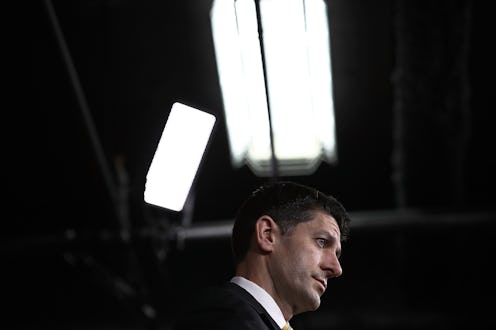News
The American Health Care Act Will Face Barriers

House Republicans have finally released a draft of their replacement to the Affordable Care Act, and though it's by no means final or complete, it paints an overall picture of how the GOP intends to repeal and replace their least-favorite Obama-era law. While more writing and legislative maneuvering is certainly ahead for the drafters of this ball, there are a number of other hurdles ahead for the GOP's Obamacare replacement before it becomes law.
First and foremost, the draft will have to be finalized and introduced as a bill. This is the stage at which House Republicans can and should heed the words of some of their GOP colleagues in the Senate, four of whom said they would oppose an ACA replacement that does away with Medicaid expansion. While the exact language of the bill doesn't specify this, Axios reported that the so-called Trumpcare law would "freeze" enrollment in Medicaid, a key provision of the ACA. According to Slate, the Medicaid tug-of-war that may ensue among Senate Republicans might actually save Medicaid expansion. The GOP's majority is so slight in the Senate (52 to the Democrats' 48) that they would need to appease the Republican senators who oppose the Medicaid provision in order to pass the bill.
After the draft is finalized and introduced as a bill in the House of Representatives, it will then need to pass before it can go to the Senate. Passage in the House shouldn't be difficult — the Republicans hold a 241-194 majority, and a simple majority passage only requires 218 votes.
After passing the House, the bill would then go to the Senate, where it would need at least 51 votes to pass. This will prove trickier if the current draft's Medicaid provision isn't nixed, given that at least four Republicans vowed to vote against the repeal if it hurts Medicaid recipients. If the draft is not changed to appease those senators, both chambers will have to create a compromise bill that can pass them both.
When and if the repeal/replace bill passes both chambers of Congress, it will then need to be signed by President Trump to become law. Given that many have begun calling the proposal "Trumpcare," there's little doubt that the president wouldn't sign it, though there's no way of knowing what he may do if the bill's language is changed.
Depending on the exact changes the final bill puts in place, legal challenges similar to those mounted against the Affordable Care Act may be the next step. It's unclear now whether Congressional Democrats can or would present legal challenges as spirited as the ones Republicans introduced against the ACA. For now, the GOP intends to pass their replacement by the end of the month, and their confidence given their control in both chambers of Congress and the White House leaves little doubt that Obamacare is on its' way out.